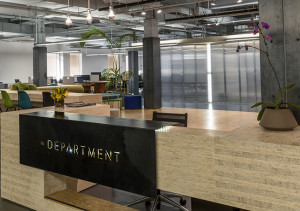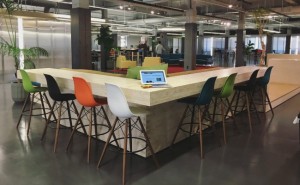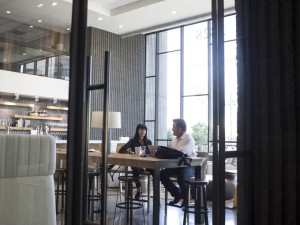The Department Adds Unique Flavor to Local Co-Working Blend
Ask a freelancer or lone entrepreneur where they get their work done, and you might get a list of the valley’s nicest coffee shops. But as co-working spaces become more common, enterprising workers are finding alternatives to the coffee shop and enjoying the flexibility and support these spaces offer.
 Collaborative work environments have evolved from something only a few ultra cool companies did, to commonplace corporate designs, and ultimately, to sprouting independent co-working entities unto themselves. One of the first spaces to make a big splash in the Phoenix market was CO+HOOTS, the collaborative workspace that is currently expanding to their second location in midtown.
Collaborative work environments have evolved from something only a few ultra cool companies did, to commonplace corporate designs, and ultimately, to sprouting independent co-working entities unto themselves. One of the first spaces to make a big splash in the Phoenix market was CO+HOOTS, the collaborative workspace that is currently expanding to their second location in midtown.
 One of the newest additions to our co-working scene is The Department, a downtown collaborative workspace, which held their grand opening in January. They offer their version of the freelancer’s gym membership in tiers, beginning with daily access to open space, where individuals can work in more structured setting than their home or a coffee shop. They also have access to printing, Wi-Fi, coffee, and the possibility of meeting someone new. Larger businesses can upgrade to dedicated desk spaces, and even more established teams can pay monthly dues for the dedicated offices that line the edges of the space.
One of the newest additions to our co-working scene is The Department, a downtown collaborative workspace, which held their grand opening in January. They offer their version of the freelancer’s gym membership in tiers, beginning with daily access to open space, where individuals can work in more structured setting than their home or a coffee shop. They also have access to printing, Wi-Fi, coffee, and the possibility of meeting someone new. Larger businesses can upgrade to dedicated desk spaces, and even more established teams can pay monthly dues for the dedicated offices that line the edges of the space.
The Department occupies the sixth floor of 1 N. First St., just one below its parent company and building owner, Marketplace One, a private investment firm. Instead of leasing the open space to a new business, the team at Marketplace One decided to build a collaborative space that would welcome a more diverse mixture of professionals and ventures to downtown.
The promise of collaboration lives just under the surface in these spaces, but encouraging people to actually talk to one another relies on a delicate blend of design and chemistry.
Matthew Moore, founder of Urban Plough Arts, is the lead designer for furniture at The Department, and he describes the challenge inherent in making a space for working that also makes people feel at ease and relaxed. The welcoming design and mix of talent leads to an organic experience, bringing together people from different levels and types of business.
“When you come off of the elevator, there is a controlled expanse so it’s not just a sea of desks … you feel welcome when you come in,” he said.
The Department is flooded with light; private offices line the walls and freestanding clusters of desks center on the open working tables that take up the middle of the floor. The kitchen windows were deliberately left unobstructed, and the dining space itself is communal, encouraging members to unplug and say hello as they grab a bite.
The Department will hopefully become the living room of the building, Moore said, as he and the Marketplace One team expand this concept to another floor in the building. The need for flexible spaces for entrepreneurs of every kind is there, he said, and they hope to perpetuate the success of The Department, which is filling up quickly.
If you haven’t yet moved into central or downtown Phoenix, this is a fantastic way to spend some time while you work. If you are considering buying a home for sale in any one of the historic Phoenix districts or anywhere in the Central Corridor, call Laura B., from HistoricPhoenixDistricts.com.
Photos courtesy of The Department.
